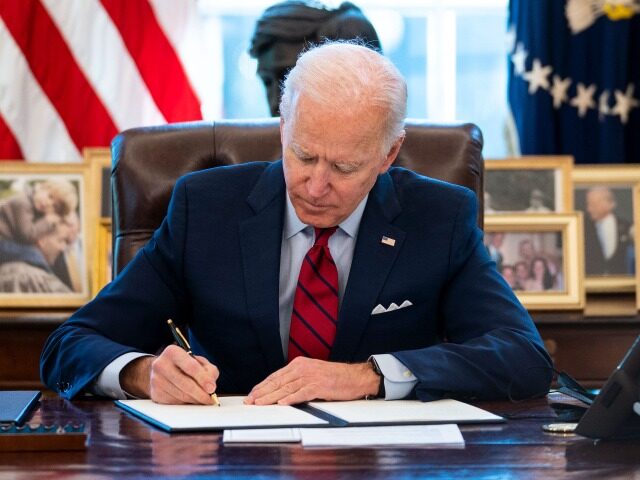President Joe Biden’s massive $1.7 trillion spending bill passed by Democrats at the end of 2022 is unconstitutional, a federal judge in Texas ruled on Tuesday, potentially halting some of Biden’s immigrations programs and opening the door to stopping the spending of many billions of dollars of taxpayer money in follow-up lawsuits.
Congress passed its 2023 omnibus appropriations bill (translation – kitchen sink fiscal trainwreck) on December 29, 2022. But in doing so, House Democrats continued their Covid-era policy of allowing members to vote from whatever remote location they were in – even vacation spots – instead of being present in the House chamber to cast their votes in person.
Texas Attorney General Ken Paxton sued, arguing that some of the federal programs being funded by that spending package were causing problems for Texas, specifically some immigration problems administered by Attorney General Merrick Garland and Homeland Security Secretary Alejandro Mayorkas.
Paxton sued over the Quorum Clause in Article I of the Constitution, which requires a majority of the House’s 435 members to be present in order for the House to do business.
Judge Wesley Hendrix from the Lubbock Division of the Northern District of Texas ruled in favor of Texas. The judge explained:
For over 235 years, Congress understood the Constitution’s Quorum Clause to require a majority of members of the House or Senate to be physically present to constitute the necessary quorum to pass legislation. This rule prevents a minority of members from passing legislation that affects the entire nation. But despite the Constitution’s text and centuries of consistent practice, the House in 2020 created a rule that permitted non-present members to be included in the quorum count and vote by proxy. Pursuant to that novel rule, the House passed a new law included within the Consolidated Appropriations Act of 2023, and that particular provision affects Texas.
“The Court concludes that, by including members who were indisputably absent in the quorum count, the Act at issue passed in violation of the Constitution’s Quorum Clause,” Hendrix declared.
The judge’s 120-page opinion walked through each of the Justice Department’s arguments trying to legally justify the spending, rejecting each in turn.
For one argument that federal courts lack power to question how bills get through the meatgrinder on Capitol Hill, the court responded:
[T]o the extent that quorum-based challenges do implicate the enrolled bill doctrine, Supreme Court precedent makes clear that the Court must first resolve any challenge to the validity of the rule used by the House or Senate to determine the existence of a quorum before the doctrine applies.
“Texas’s challenge involves ordinary constitutional interpretation of a restriction on congressional power,” Hendrix said when rejecting the political-question doctrine, which says that the Constitution puts certain matters in the hands of the elected branches of government, not the judiciary. He reasoned, “The Court need not engage in policymaking to resolve the merits. Instead, it simply looks to the Constitution’s text, original public meaning, and historical practice, as courts routinely do.”
The Trump-appointed trial judge concluded:
Based on the Quorum Clause’s text, original public meaning, and historical practice, the Court concludes that the Quorum Clause bars the creation of a quorum by including non-present members participating by proxy. Supreme Court precedent has long held that the Quorum Clause requires presence, and the Clause’s text distinguishes those absent members from the quorum and provides a mechanism for obtaining a physical quorum by compelling absent members to attend.
Hendrix put a hold (called a stay) on his order for seven days to allow the Biden administration to take this case to the U.S. Court of Appeals for the Fifth Circuit.
The case is Texas v. Garland, No. 5:23-cv-34-H in the U.S. District Court for the Northern District of Texas.
Breitbart News senior legal contributor Ken Klukowski is a lawyer who served in the White House and Justice Department. Follow him on X (formerly Twitter) @kenklukowski.

COMMENTS
Please let us know if you're having issues with commenting.